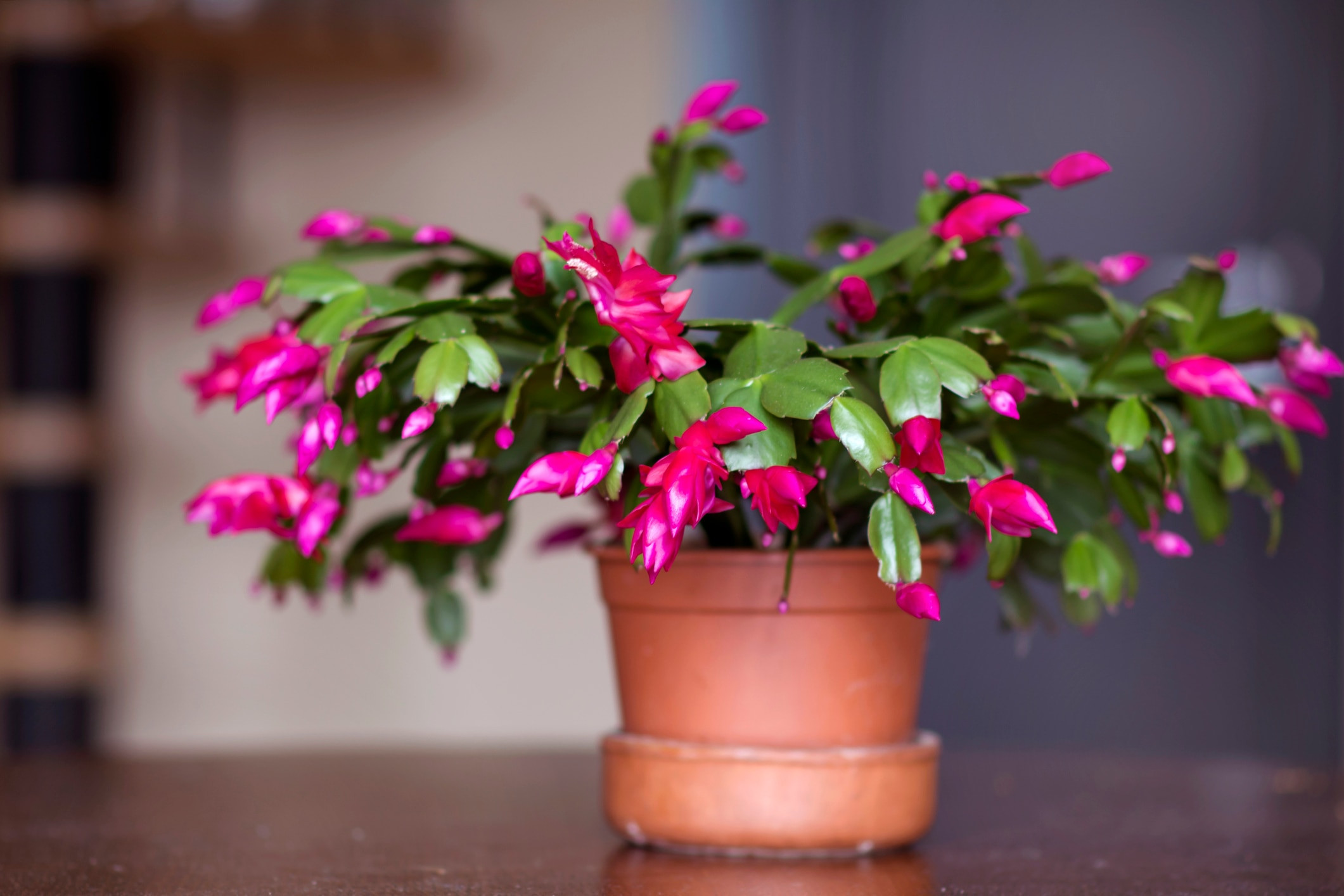Is Schlumbergera Poisonous To Cats? Yes, while Christmas cacti (schlumbergera) are considered mildly toxic to cats, ingestion can lead to digestive discomfort. At solcat.net, we understand the importance of keeping your feline friends safe and healthy, especially during the holidays. Learn how to protect your cat from plant-related hazards and ensure a happy, worry-free season with our expert advice.
1. What is Schlumbergera and Why is it Popular?
Schlumbergera, commonly known as Christmas cactus, Thanksgiving cactus, or Easter cactus, is a popular houseplant cherished for its vibrant blooms during the holiday season. These plants belong to the Schlumbergera genus and are native to the rainforests of Brazil. Their popularity stems from their unique appearance, ease of care, and the burst of color they bring to homes during the winter months.
- Unique Appearance: Schlumbergera plants feature segmented, flattened stems that resemble leaves, with vibrant flowers blooming at the tips.
- Ease of Care: These cacti are relatively low-maintenance, thriving in bright, indirect light and requiring infrequent watering.
- Holiday Blooms: Their flowering period coincides with major holidays, making them a festive addition to any home.
 christmas cactus in a pot with red flowers
christmas cactus in a pot with red flowers
A potted Christmas cactus plant known for its vibrant red flowers, adding festive charm to homes during the holiday season.
2. Is Schlumbergera Toxic to Cats?
Is schlumbergera poisonous to cats? While schlumbergera is considered mildly toxic, it’s essential to understand the potential risks it poses to your feline companion.
- Low Toxicity: According to the ASPCA, Christmas cacti are listed as non-toxic to cats. However, this doesn’t mean they are entirely safe.
- Gastrointestinal Irritation: The primary concern with schlumbergera is its potential to cause gastrointestinal irritation if ingested. The plant’s fibrous material can irritate a cat’s mouth, throat, and stomach lining.
- Symptoms: If a cat consumes schlumbergera, it may experience symptoms such as vomiting, diarrhea, reduced appetite, and lethargy. The severity of these symptoms depends on the amount of plant material ingested.
According to research from the ASPCA in July 2023, schlumbergera can cause mild gastrointestinal upset in cats due to its fibrous nature.
3. What are the Symptoms of Schlumbergera Poisoning in Cats?
If you suspect that your cat has nibbled on your schlumbergera, it’s crucial to monitor them for any signs of distress. Recognizing the symptoms of schlumbergera poisoning can help you take prompt action and seek veterinary care if needed.
- Vomiting: This is a common response to digestive upset and can occur shortly after ingestion.
- Diarrhea: The plant’s fibrous material can disrupt the normal digestive process, leading to loose stools.
- Reduced Appetite: Your cat may show a decreased interest in food due to stomach discomfort or nausea.
- Lethargy: If your cat seems unusually tired or weak, it could be a sign that their body is struggling to process the plant material.
- Drooling: Excessive drooling can indicate nausea or irritation in the mouth and throat.
- Lip-Smacking: This behavior can also suggest nausea or discomfort in the oral cavity.
It is important to contact your veterinarian or the Pet Poison Helpline immediately if you notice any of these symptoms.
4. What to Do if Your Cat Eats Schlumbergera?
If you catch your cat munching on your schlumbergera, don’t panic. Here’s a step-by-step guide on what to do:
- Remove the Plant: Take the schlumbergera away from your cat to prevent further ingestion.
- Assess the Situation: Determine how much of the plant your cat has eaten. A small nibble is less concerning than a significant portion.
- Monitor Your Cat: Keep a close eye on your cat for any signs of gastrointestinal upset.
- Contact Your Veterinarian: Call your veterinarian or the Pet Poison Helpline for guidance. They can assess the situation and advise you on the best course of action.
- Pet Poison Helpline: 1-855-764-7761 (a consultation fee may apply)
- Follow Veterinary Advice: Follow your veterinarian’s instructions carefully. They may recommend monitoring your cat at home or bringing them in for a check-up.
- Provide Supportive Care: If your veterinarian advises home monitoring, ensure your cat has access to fresh water and a bland diet. Avoid giving them any medications unless specifically instructed by your vet.
According to the American Animal Hospital Association (AAHA), it’s always best to consult a veterinary professional when your pet ingests a potentially harmful substance.
5. How is Schlumbergera Poisoning in Cats Treated?
Treatment for schlumbergera poisoning in cats typically focuses on alleviating symptoms and preventing further complications. The specific approach will depend on the severity of the symptoms and the amount of plant material ingested.
- Veterinary Examination: Your veterinarian will perform a thorough physical examination to assess your cat’s condition.
- Fluid Therapy: If your cat is experiencing vomiting or diarrhea, fluid therapy may be administered to prevent dehydration.
- Anti-Nausea Medication: Medications to reduce nausea and vomiting can help alleviate discomfort and prevent further fluid loss.
- Gastroprotectants: These medications can help protect the stomach lining and reduce irritation.
- Monitoring: Your veterinarian may recommend monitoring your cat’s kidney function and electrolyte levels, especially if they have experienced significant vomiting or diarrhea.
- Supportive Care: Ensure your cat has a quiet, comfortable place to rest and access to fresh water.
In most cases, cats recover fully from schlumbergera poisoning with prompt and supportive care.
6. Are There Other Holiday Plants That Are Poisonous to Cats?
While schlumbergera poses a relatively low risk to cats, many other holiday plants can be much more dangerous. It’s essential to be aware of these potential hazards and take precautions to protect your feline friend.
| Plant | Toxicity Level | Symptoms |
|---|---|---|
| Lilies | Highly Toxic | Kidney failure, vomiting, lethargy, loss of appetite |
| Mistletoe | Toxic | Vomiting, diarrhea, abdominal pain, cardiovascular problems |
| Holly | Toxic | Vomiting, diarrhea, drooling, loss of appetite |
| Poinsettia | Mildly Toxic | Mild vomiting, diarrhea, drooling |
| Christmas Tree | Mildly Toxic | Gastrointestinal upset, vomiting, diarrhea, irritation of the mouth and skin (due to sap or needles) |
| Amaryllis | Toxic | Vomiting, diarrhea, abdominal pain, tremors, decreased blood pressure |
According to the Pet Poison Helpline, lilies are particularly dangerous to cats and can cause severe kidney damage, even in small amounts.
A cat curiously sniffing a Christmas tree, highlighting the potential dangers holiday decorations can pose to pets.
7. How to Keep Your Cat Safe During the Holidays
The holiday season is a time for joy and celebration, but it can also present some unique challenges for pet owners. By taking a few simple precautions, you can ensure that your cat stays safe and healthy throughout the holidays.
- Plant Placement: Keep holiday plants out of reach of your cat. Place them on high shelves or in rooms that your cat cannot access.
- Pet-Friendly Decorations: Opt for pet-friendly holiday decorations. Avoid using tinsel, ribbons, or ornaments that your cat might be tempted to chew on.
- Secure Christmas Trees: Secure your Christmas tree to prevent it from tipping over if your cat tries to climb it.
- Monitor Your Cat: Keep a close eye on your cat, especially when they are around holiday plants and decorations.
- Educate Guests: Inform your guests about the potential hazards of holiday plants and decorations. Ask them not to feed your cat any table scraps or holiday treats.
- Provide a Safe Space: Create a safe space for your cat where they can retreat if they feel overwhelmed by the holiday festivities.
According to a study by the American Veterinary Medical Association (AVMA), the holiday season sees an increase in pet-related emergencies due to ingestion of toxic substances and injuries from decorations.
8. Alternative Pet-Safe Holiday Decorations
If you’re concerned about the potential dangers of holiday plants and decorations, there are plenty of pet-safe alternatives to choose from.
- Artificial Plants: Opt for artificial holiday plants that are non-toxic and won’t pose a risk to your cat.
- Pet-Friendly Ornaments: Choose ornaments made from materials that are safe for pets, such as felt, wood, or plastic.
- LED Lights: Use LED lights instead of traditional incandescent lights, which can get hot and pose a burn risk.
- Natural Decorations: Decorate with natural items like pinecones, cranberries, and oranges. These items are generally safe for pets, but it’s still best to keep them out of reach.
Consider cat grass as a safe and enjoyable alternative for your cat to nibble on.
9. Understanding the Search Intent Behind “Is Schlumbergera Poisonous to Cats”
To provide the most relevant and helpful information, it’s essential to understand the search intent behind the query “is schlumbergera poisonous to cats.” Here are five potential search intents:
- Confirmation: Users want to confirm whether schlumbergera is indeed poisonous to cats.
- Severity: Users want to know how toxic schlumbergera is to cats and the potential health risks.
- Symptoms: Users want to identify the symptoms of schlumbergera poisoning in cats.
- Treatment: Users want to learn about the treatment options for cats who have ingested schlumbergera.
- Prevention: Users want to find out how to prevent their cats from eating schlumbergera and other toxic plants.
By addressing each of these search intents, we can provide a comprehensive and informative resource for cat owners concerned about the safety of their feline companions.
10. FAQs About Schlumbergera and Cat Safety
Here are some frequently asked questions about schlumbergera and cat safety:
- Is schlumbergera poisonous to cats?
- Schlumbergera is considered mildly toxic to cats and can cause gastrointestinal upset if ingested.
- What parts of the schlumbergera plant are toxic to cats?
- All parts of the schlumbergera plant can cause irritation if ingested.
- How much schlumbergera does a cat need to eat to get sick?
- Even a small amount of schlumbergera can cause symptoms in sensitive cats. The more a cat eats, the more severe the symptoms are likely to be.
- What are the symptoms of schlumbergera poisoning in cats?
- Symptoms may include vomiting, diarrhea, reduced appetite, lethargy, drooling, and lip-smacking.
- What should I do if my cat eats schlumbergera?
- Remove the plant, monitor your cat for symptoms, and contact your veterinarian or the Pet Poison Helpline for guidance.
- How is schlumbergera poisoning in cats treated?
- Treatment typically involves supportive care, such as fluid therapy, anti-nausea medication, and gastroprotectants.
- Are there any other plants that are poisonous to cats?
- Yes, many other plants are toxic to cats, including lilies, mistletoe, holly, and poinsettias.
- How can I keep my cat safe during the holidays?
- Keep holiday plants out of reach, opt for pet-friendly decorations, and monitor your cat closely.
- What are some pet-safe alternatives to holiday plants?
- Artificial plants, pet-friendly ornaments, LED lights, and natural decorations like pinecones and cranberries are all safe alternatives.
- Where can I find more information about cat safety?
- You can find more information about cat safety on solcat.net, the ASPCA website, and the Pet Poison Helpline website.
Conclusion
While the Christmas cactus is only mildly toxic, remember that a safe holiday season for you and your feline friend involves awareness and caution. solcat.net is dedicated to providing you with reliable and current information, so please explore our website for more resources and insights into the world of cat care. Is schlumbergera poisonous to cats? Now you know the answer is yes, it can cause mild issues. If you have any concerns about your cat’s health or behavior, reach out to our team or visit us at 950 Alaskan Way, Seattle, WA 98104, United States, or call +1 (206) 386-4000.

